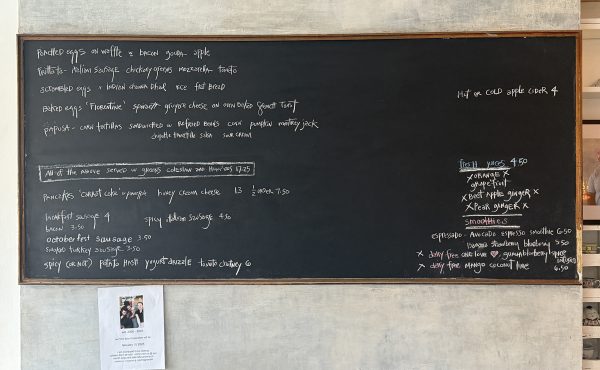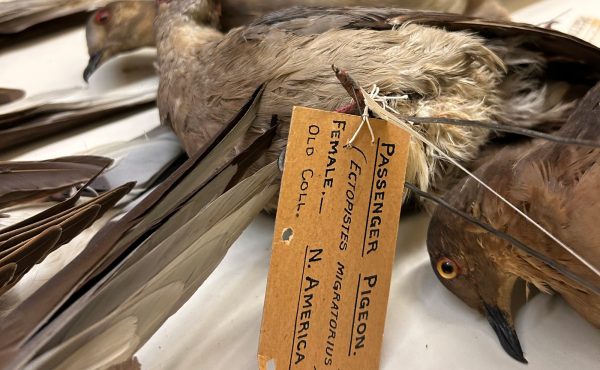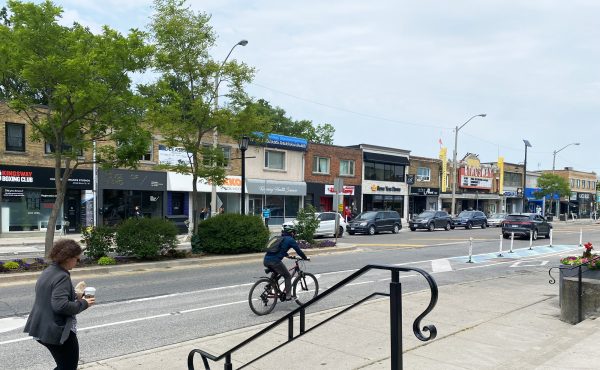
The folks who make the Ghost Bikes that mark where cyclists have been killed by cars are planning an after event for tonight’s monthly critical mass bike ride that starts at 6pm at Bloor and Spadina. From one of the organizers:
This Months Critical Mass, I will lead the mass ride to Dufferein and Bloor, and ask them to wait while I put up another ghost bike. This white bike serves as a replacment for the one that was taken down. This bike will be nameless (until i can engrave a plaque) and will stand as a warrning to all cycylist that use the interscetion.
After the mass ride, Bike Pirates (457 Bathurst) will be serving a free vegan meal and hot chocolate. The only price is to talk about the critical mass ride and the ghost bike memorial concept.
(Photo of Ghost Bike at Keele and Finch by Geoffrey Bercarich)




10 comments
Are ghost bikes intended to be permanent memorials or temporary?
I don’t know — they lock them up though. Perhaps somebody involved will post an answer.
i think they are meant to be permanent… though the city has removed them in the past. i am not involved, so further clarification would be useful.
From what I have heard, they are either removed by the city, or removed after a time by the organizers so as not to traumatize the bereaved family.
Ghost bikes are intended as permanent memorials.
So far no organizers have not removed any ghost bike in Toronto. I was present at every ghost bike installed in Toronto thus far (tonight will be the sixth) and so far city staff has no admitted to removing any ghost bikes. It may be that the city has removed bikes on behalf of the public or relatives, etc. without my knowledge.
If people do not wish to offend the family with permanent ghost bike memorials, then do what they do in NYC with pedestrian deaths: make a stencil and spray it. M aybe something smaller than shown, like the symbol for bikes used on our bike route signs with RIP, and the date of death.

It’s an interesting thing — the ghost bikes demonstrate how dangerous it can be to ride in Toronto, even though official policy is to encourage bike riding. But at a personal level, what if a family doesn’t want the memorial?
It’s a little like those streetside shrines people build at car accident sites. On a psychogeography walk we came across a memorial for two dead teenagers on Sheppard in Willowdale last year. We read the cards; “I miss you” “I love you” “I don’t know what to do.” This is similar, but not put up by those close to the person, somewhat more impersonal and political. Is it fair game? I don’t know.
Ghostbikes were never intended to be “permanent”. For all three deaths last year there was family input in some form as to how long the Ghostbikes would remain. There were also some other concerns. No firm length of time was ever decided but the Ghostbikes were eventually removed by whomever, it does not really matter who or for what reason. They were intended as solemn signs of respect. They also represent real lives, complicated by an untimely death.
I was really uncomfortable last night at CM. The Ghostbike delivery was more theatre than respect. The message was poorly delivered and probably confused a lot of spectators. The message delivered via the TV was that it is too dangerous to ride therefore one should not and that five more cyclists will die this year. Some basic facts of the cyclists death were incorrect, like the year she died. I even began to wonder if the whole spectacle was to advertise some free food.
I don’t think that a family owns the departed. They are a citizen and a friend and have relevance to many people outside of their circle of relatives.
The fallen cyclist’s fate is a reminder to other cyclists of their vulnerability, their mortality and their consequent responsibility to take control in their riding and their politics.
Hopefully it serves to remind motorists of the extreme imbalance of power their choice of vehicle brings to the public streets and their responsibility to control that power safely and respectfully.
I don’t think this is even slightly exploitative because any gains for cycling are gains for all society (fewer accidents, cleaner air, healthier populace, clearer roads, etc.) and no one is trying to profit from the misfortune of the fallen.
I’ve been on several memorial rides and from the impact they had on me, I would not deprive anyone of the chance at deep reflection that they offer. When a close friend was killed on his bike some years back, the ride in his memory was a beautiful emotional journey for well over a hundred people that culminated in a party celebrating his life. In that case the family was involved but I think that it was a great demonstration of the principle that private pain is just that-pain. Whereas a sharing of the event offers others a chance to learn and grow.
There is a great quote buried in one or two Spider Robinson books that I will now butcher.
Shared pain is diminished whereas shared joy is increased.
(Sorry Spider)
\my thoughts
Nick,
The difference between the citizen and a family member is that citizen choses and the family member is forced to deal with the death of a loved one. Some form of balance between two is needed with preference to the needs of the family. I do not think cyclists need a reminder of their vulnerability. Any two cyclists that meet and the discussion will quickly turn to their vulnerability on the road. A memorial is to respect the life of someone who lost their life to that vulnerability.
Imagine you were standing on the corner of Bloor and Dufferin Friday night waiting for the bus. Were the cyclists celebrating or mourning the loss of a cyclist? It was a circus. I am not a family member and found it disrespectful.
I suspect that the strong numbers at CM were because of the efforts of Bike Pirates. They truly need to be commended for it. Hopefully they figure out quick how they got people out to CM and not lose out to the theatre of Ghostbike installations.